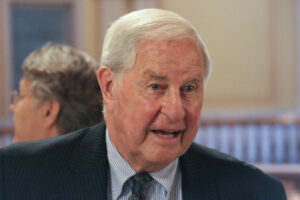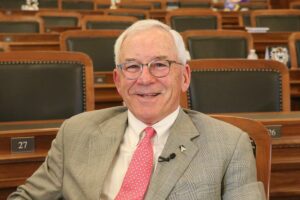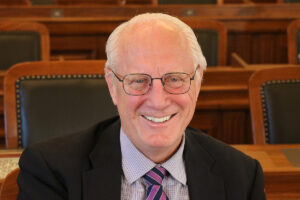Topic: Attorneys in the legislature

Interview of Robert (Bob) Storey, February 5, 2015
Interviewed by Burdett Loomis
Bob Storey in his 2015 oral history interview recalls his service in the Kansas Senate from 1969-1976. His recollection is of a senate that was in transition in terms of urban-rural influence on policymaking due to the one-person, one-vote principle enunciated by the U.S. Supreme Court in the mid-1960s. He recalls intricacies of interactions among senate leaders and governors and occasional intrigue in senate leadership elections. He also reflects on improvements in the functioning of state government during the years when reorganization and modernization of many state functions took place.

Interview of Donna Whiteman, January 19, 2018
Interviewed by H. Edward (Ed) Flentje
Former Representative Donna Whiteman's 2018 oral history interview provides detail about how the legislature functioned from 1983-1991. She describes the culture as less demonizing, more collegial and civil than is generally assumed by the public. Whiteman rose to a leadership position fairly quickly and became Majority Leader when the Democrats gained the majority in the House in 1991. One of Whiteman's assigned roles was to work with a group of Republicans called "The Rebels" - seven to nine members who would vote with the Democrats on certain bills. Whiteman also describes in some detail her Show Moreexperiences as a member of Governor Joan Finney's cabinet, particularly on issues such as foster care, long term care, and children and families. She observes that "after all the struggling in the 1991 session, the 1992 session is the shining star of progressive activity" and that the Children's Initiative produced visible, tangible, and beneficial legislation.
A version of this interview is also posted on KansasMemory.org, the website of the Kansas Historical Society. Show Less

Interview of Mike O'Neal, April 16, 2021
Interviewed by Alan Conroy
Former Speaker Mike O'Neal's interview covers his 28 years in the Kansas House and his impact as Chair of the House Judiciary Committee on the Kansas legal system, both criminal and civil. In fact, O'Neal chaired the House Judiciary Committee three different times totaling 13 years and also served as Chairman of the House Education Committee and a redistricting committee in 2002. He has been involved with workers compensation issues and medical malpractice. O'Neal explains his own evolution in thinking as he, and his constituents, became more conservative. He candidly discusses his race for Speaker of the Show MoreHouse and compares the leadership styles of other speakers with whom he served. O'Neal left the House in 2012 after finishing his second term as Speaker to take a position with the Kansas Chamber of Commerce as its chief executive officer. After four years with the Kansas Chamber he retired to open his own legal consulting and governmental relations firm, O'Neal Consulting, LLC. Show Less

Interview of Ron Hein, April 16, 2021
Interviewed by Alan Conroy
Ron Hein, former legislator, lobbyist, and lawyer speaks about his 47 years in and around the Kansas Legislature and his impact on Kansas policy. He ran first for the House in 1974 in a 7-way primary which he won. Two years later he ran for the Senate, winning after extensive door-to-door campaigning against a well-known Senator, Bob Storey. He was just 25 when he was sworn into the Senate in 1975, Hein tells some interesting anecdotes about working with Speaker Pete McGill and Senate President Ross Doyen, particularly in his first years in the legislature. Hein Show Moresponsored or cosponsored 142 pieces of legislation on a wide variety of topics. His interview recounts the difficulty he had getting the Higher Education Loan program passed when he was in the House. Ultimately it failed the first year but passed the second. Hein noted the lack of lawyers in today's legislature is detrimental to the process, as is an increased lack of civility. The interview concludes with Hein discussing his lobbying career and why he felt he needed to leave elected office when T. Boone Pickens approached him to represent Mesa Petroleum. Hein notes that he has been more successful getting legislation passed as a lobbyist than as a legislator. Show Less

Interview of John Solbach, June 11, 2021
Interviewed by Alan Conroy
John Solbach served in the Marines, was wounded in combat in Vietnam, returned to Kansas to finish college and law school and ran for the Kansas legislature in 1978. He represented Lawrence/rural Douglas country in the House for 14 years. Solbach's interview is replete with entertaining stories, starting with his Populist ancestors' takeover of the Kansas House in 1890, to stories about how Mike Hayden helped him get a $4,000 appropriation to bring David Eisenhower to Kansas. He teamed up with Wint Winter Jr. to pass a Uniform Conservation Easement Law in spite of Sen. Ross Doyen; Show More he and R.H. Miller stopped a group of rural electric cooperatives from taking the Wolf Creek Nuclear plant out from under the control of the Kansas Corporation Commission. Solbach considers the sentencing guidelines, passed in 1992 while he chaired the House Judiciary Committee as the best legislation of his career. Show Less

Interview of Joe Knopp, October 15, 2021
Interviewed by Alan Conroy
Joe Knopp's interview takes place 33 years after he left the legislature in 1988 after losing a close election and short-circuiting his political career. His recollections are still vivid and his interview describes a legislature that has changed considerably in recent years.
Knopp served from 1981 through 1988 and during that time as chair of the House Judiciary Committee was involved in many significant issues: medical practice, corporate hog farming, changes in the DUI law, death penalty, reapportionment, severance tax. As Majority Leader he dealt with a growing split in the Republican caucus --led by the Rebels. Show More He tried to get votes for a special session on a new highway plan. He describes in detail the process of getting elected to a leadership position and how he won by one vote. He talks candidly about balancing his personal views with those of his constituents, particularly on liquor and gambling issues --and he speaks analytically about losing the election in 1988 and again in 2012 when he ran for the Senate. Good insights for anyone contemplating a run for public office. Show Less

Interview of Kathleen Sebelius, October 28, 2022
Interviewed by Joan Wagnon and Duane Goossen
Sebelius ran for the legislature to "go home." Her kids were ages 2 and 5 and she was eager to get out of a demanding job to spend more time at home--better work-life balance. She discussed the changes in the culture of the legislature and state government she experienced over the 30 plus years she served in public office. When both US Senate seats came open in 1996, a fissure was created in the Republican party when Brownback challenged Sheila Frahm for one of the seats. She notes the insurance industry was very partisan and tilted Show Moretoward the industry side. The discussion of budget issues with Goossen and Sebelius show their creativity in solving problems, even though her experience as governor was bookended by recessions. School finance also posed some unique challenges because the Great Recession got in the way of the court's mandates. Phill Kline, the Attorney General was urging Republicans to do nothing. The BEST teams they created were important in solving the budget crisis. The interview concludes with some discussion of her selections of Lt. Governors and her experiences at HHS and her activities after leaving government service. Show Less
